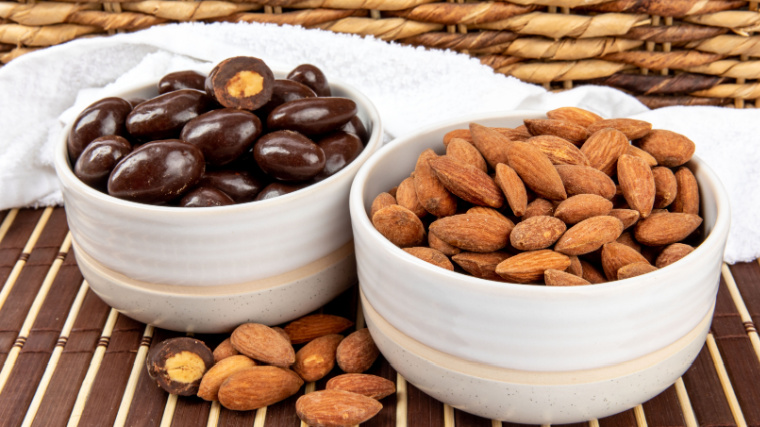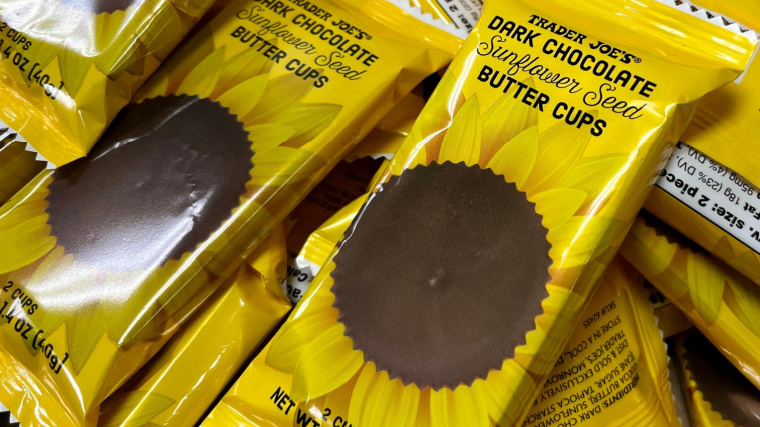Using the monkey bars and jump rope isn’t the only way to bring your workouts back in time. Munching on your favorite Halloween candies is a surefire way to satisfy your sweet tooth while bringing back childhood memories of trick-or-treating, Halloween costumes, and spooky good times.

But, can noshing on Halloween candy help promote post-workout gains? Fortunately for your inner child… yes (to a point). Here’s what you need to know about eating candy after workouts, including how sugar is involved in muscle recovery and which candies make the best choice for a post-workout snack.
- How Can Sugar Help Muscle Recovery?
- Best Halloween Candy for Post-Workout Gains
- Frequently Asked Questions
How Can Sugar Help Muscle Recovery?
Although there are plenty of more nutritious post-workout snacks and post-workout meals to choose from, enjoying some candy after your gym session could support muscle recovery and growth.
Most candies are a source of rapidly absorbable carbs in the form of simple sugars, which your body converts to glucose. Whatever glucose isn’t used for immediate energy is sent to the muscle and liver to be stored as glycogen. Intense workouts deplete muscle glycogen stores, so snacking on a piece of candy can help replenish glycogen, which is key to post-workout recovery.
Pairing carbs with a source of protein seems to be especially effective for stimulating glycogenesis, or glycogen synthesis, which speeds muscle recovery. Plus, protein provides the amino acids required for muscle repair, recovery, and growth.

[Read More: The 13 Best Protein Powder]
In fact, a 2021 meta-analysis of 20 studies found that co-ingesting carbs and proteins post-workout was more effective for enhancing glycogen synthesis compared to carbs alone. The researchers concluded that combining carbs and proteins maximized glycogen synthesis and stimulated muscle protein synthesis, yielding the most complete post-workout recovery. (1)
This means that pairing carb-rich candy with a protein source or choosing candies that contain some protein-rich ingredients, like nuts, is a good choice if you’re craving something sweet after your workout. (2)
Can Sugar Hinder Post-Workout Gains?
Sure, a little sugar can go a long way toward giving you the carb-plus-protein boost your muscles love after a rigorous training session.
However, unless you’re an endurance athlete or are regularly performing high-intensity training, you can generally replenish glycogen stores and support muscle recovery by following a regular meal pattern, including consuming a carb and high-protein snack sometime after your workout. No need for the hard stuff — by which we mean, candy.
While enjoying some candy after your workout can deliver nutrients your body needs to support post-workout recovery, you may not want candy to be your go-to post-workout snack. Most candy is very high in added sugar, and while added sugar can replenish glycogen stores, so can more nutritious carb options, like fruit or yogurt.

[Read More: Best Protein Bars]
Eating too much added sugar can harm your health in several ways, including damaging your teeth, increasing blood sugar and insulin levels, and increasing your risk of health conditions like non-alcoholic fatty liver disease (NAFLD). (3)
So, while there’s nothing wrong with occasionally snacking on some candy after your gym session, you may want to err toward less Halloween-esque fuel sources for your everyday recovery snack.
Best Halloween Candy for Post-Workout Gains
The following Halloween candies provide a source of carbs and protein, which can help fuel post-workout recovery.
Unreal Dark Chocolate Caramel Peanut Nougat Bars
Unreal Dark Chocolate Caramel Peanut Nougat Bars are a good choice if you’re craving a chewy, chocolatey, post-workout sweet. These candy bars are individually wrapped, so you can toss a few of these sweets into your gym bag for a convenient fuel source.
[Read More: The 12 Best Supplements for Muscle Growth]
According to the Unreal website, each bar provides 90 calories, 11 grams of carbs, six grams of added sugar, and two grams of protein.
Chocolate-Covered Almonds
Chocolate-covered nuts are one of the simplest and most satisfying candies you can eat. They’re the perfect combo of sweet chocolate and crunchy almonds that provide the carbs and proteins your body needs post-workout.

[Read More: Best Protein Shakes]
According to the Nuts.com website, a 1.5-ounce serving of dark chocolate-covered almonds provides 215 grams of carbs, 24 grams of carbs, 19 grams of added sugar, and three grams of protein.
Pearson’s Original Salted Nut Roll
Not a fan of chocolate? Try snacking on a Pearson’s Original Salted Nut Roll after the gym. It’s the perfect combo of caramel, peanuts, and nougat, and provides a source of rapidly absorbed carbs and protein to promote muscle repair and recovery.
[Read More: Best Meal Replacement Shakes]
According to the Pearson’s Candy website, one bar contains 230 calories, 31 grams of carbs, 23 grams of added sugar, and six grams of protein.
Trader Joe’s Sunflower Seed Butter Cups
Allergic to nuts but still want a creamy, chocolate treat? Trader Joe’s Sunflower Seed Butter Cups are just as delicious as peanut butter cups but are safe for those with peanut and tree nut allergies. The sweet chocolate covers your carb needs, while the salty sunflower butter provides a source of protein for muscle recovery.

[Read More: What You Need to Know About How to Build Muscle]
According to the Trader Joe’s website, two sunflower seed butter cups provide 230 calories, 16 grams of carbs, 11 grams of added sugar, and four grams of protein.
Siren Snacks Cookie Dough Protein Bites
Siren Snacks Cookie Dough Protein Bites provide 10 grams of protein per serving, making them much higher in protein than most other sweets. These bites are free from dairy, grains, soy, and gluten, so they’re safe for those with allergies and intolerances, as well as people who follow specific diet, like the paleo diet.
[Read More: 9 Types of Diets — How They Work and Pros & Cons]
According to the Siren Snacks website, one bag of Cookie Dough Protein Bites contains 210 calories, 21 grams of carbs, one gram of added sugar, and 10 grams of protein.
Snack Away
No matter if you have a serious sweet tooth or you’re simply enjoying the seasonal Halloween candy selection, snacking on a sugary treat after your workout can benefit recovery by providing your body with the nutrients it needs to replenish glycogen stores and repair muscle.
Though you’ll generally want to forego candy as your go-to snack after every workout, enjoying a handful of chocolate-covered almonds or your favorite candy bar after your gym session can be a convenient and tasty way to refuel — especially during spooky season.
FAQs
Here are the answers to some lingering questions you might have about pouring the contents of your trick-or-treat bag into your gym bag.
Choosing a candy that provides a source of rapidly absorbed carbs and a source of protein can provide your body with the nutrients it needs to replenish glycogen stores and promote muscle protein synthesis for growth and recovery.
Candy can provide certain nutrients important for performance and muscle growth, but it certainly isn’t your first or only choice for muscle recovery or performance enhancement. The best way to ensure you’re giving your body what it needs to support increased strength and endurance is to follow a nutritious, minimally processed diet high in protein, complex carbs, and healthy fats.
Consuming small amounts of candy usually isn’t an issue for most people. However, eating a diet high in added sugar has been linked to an increased risk of a number of health conditions, from fatty liver disease to heart disease. (4)
This is why the American Heart Association recommends limiting added sugars to no more than six percent of total calories per day, which equates to six and nine teaspoons of added sugar for cis women and cis men, respectively. (4) Though there’s certainly nothing wrong with enjoying your favorite candy after the gym from time to time, you may want to limit candy from being part of your everyday diet.
References
- Margolis, L. M., Allen, J. T., Hatch-McChesney, A., & Pasiakos, S. M. (2020). Coingestion of Carbohydrate and Protein on Muscle Glycogen Synthesis after Exercise. Med Sci Sports Exerc. 2021 Feb; 53(2): 384–393.
- Murray, B., & Rosenbloom, C. (2018). Fundamentals of glycogen metabolism for coaches and athletes. Nutr Rev. 2018 Apr; 76(4): 243–259.
- Gillespie, K. M., Kemps, E., White, M. J., & Bartlett, S. E. (2023). The Impact of Free Sugar on Human Health—A Narrative Review. Nutrients. 2023 Feb; 15(4): 889.
- American Heart Association . (2021, November 2). Added Sugars. www.heart.org.
Featured Image: Longfin Media / Shutterstock